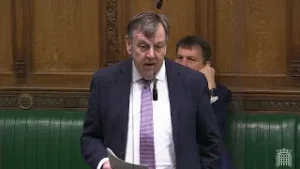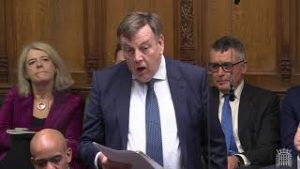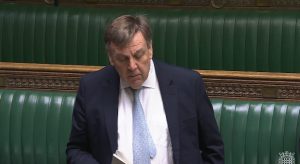David Lammy Foreign Secretary, Foreign, Commonwealth and Development Office
With permission, Madam Deputy Speaker, I will make a statement on Syria. Over less than a fortnight there has been an extraordinary change. What began as an opposition offensive in north-western Syria quickly became a headlong retreat by pro-Assad forces and, over the weekend, the fall of his murderous regime. On 30 November, the regime withdrew from Aleppo; on 5 December, Hama; on 6 December, Daraa and Homs; and on 7 December, Damascus.
As this Government came into office, some in the international community and some in this House asked whether we would re-engage with Assad. His Russian and Iranian allies have long championed him, last year he returned to the Arab League, and increasingly other Governments were also starting to step up their presence in Damascus. This Government choose not to re-engage. We said no because Assad is a monster. We said no because Assad was a dictator whose sole interest was his wealth and his power. We said no because Assad is a criminal who defied all laws and norms to use chemical weapons against the Syrian people. We said no because Assad is a butcher with the blood of countless innocents on his hands. We said no because Assad was a drug dealer, funding his regime through Captagon and illicit finance, and we said no because he was never ever going to change.
There were those who used to call Assad “the lion of Damascus.” Now we see the reality: Assad is the rat of Damascus, fleeing to Moscow with his tail between his legs. How fitting he should end up there. We see streets of Syrians cheering his demise, tearing down his statutes and re-uniting with loved ones who had been disappeared. We have long hoped to see him gone and welcome the opportunity this brings for the people of Syria.
Assad’s demise is not just a humiliation for him and his henchman; it is a humiliation for Russia and Iran. Iran’s so-called axis of resistance is crumbling before our eyes and all Vladimir Putin has got from his attempt to prop up Assad for more than a decade is a fallen dictator filing for asylum in Moscow. He says he wants to return Russia to its imperial glory, but after more than 1,000 days he has not subjugated Ukraine. Putin’s fake empire stops short just a few miles outside Donetsk. I have no fear of it, only disgust.
Of course, our revulsion at Assad, his henchmen and those who propped him up must not blind us to the risks of this moment. Assad’s demise brings no guarantee of peace. This is a moment of danger as well as opportunity for Syrians and for the region. The humanitarian situation in Syria is dire, with almost 17 million people in need. Millions are refugees still, largely in neighbouring Türkiye, Lebanon and Jordan. Seeing so many start to return to Syria is a positive sign of their hopes for a better future now that Assad is gone, but a lot depends on what happens now. This flow into Syria could quickly become a flow back out, which would potentially increase the numbers using dangerous, illegal migration routes to continental Europe and the United Kingdom.
Syria has proven to be a hotbed of extremism. The House will know that the group whose offensive first pushed back the regime, Hayat Tahrir al-Sham—or HTS, as it is now being called—are a proscribed terrorist organisation in the UK as an alias of al-Qaeda. That should rightly make us cautious. Thus far, HTS have offered reassurances to minorities in Aleppo, Hama and Damascus. They have also committed to co-operating with the international community over monitoring chemical weapons. We will judge HTS by their actions, monitoring closely how they and other parties to this conflict treat all civilians in areas they control.
The UK and our allies have spent over a decade combating terrorism in Syria. Daesh remains one of the most significant terrorist threats to the UK, our allies and our interests overseas. We take seriously our duty as a Government to protect the public from this and other terrorist threats.
Amid this uncertainty, the Government have three priorities, first and foremost of which is protecting all civilians, including, of course, minorities. For more than a decade, Syria has been racked by terrible sectarian violence. We continue to do what we can to provide humanitarian support wherever we can. The UK has spent over £4 billion on the Syrian crisis to date. UK-funded mobile medical units already provide emergency services across northern Syria. Last week, we gave a further £300,000 to the White Helmets and today the Prime Minister has announced an additional £11 million of humanitarian support for Syrians.
The second priority is securing an inclusive, negotiated political settlement, as I discussed with the UN special envoy for Syria, Geir Pedersen, yesterday. This is how the Syrian people can begin to chart a path to a united and peaceful Syria.
The final priority is preventing escalation into the wider region. For more than a year, the middle east has been in the grip of a series of interlocking conflicts, which threatened to become an even more catastrophic war; and in Syria itself, Russia and Iran have kept Assad’s regime on life support. If we are to achieve a better future for Syrians, we should let Syrians themselves determine their future.
We must learn another lesson from this crisis, too. Illicit finance was a fundamental part of Assad’s playbook, and it is part of Putin’s playbook and the playbook of dictators and criminals around the world. This hurts ordinary people in our own country and people in Syria. It drives up crime and drives up house prices here in the UK. That is why today I am announcing £36 million in new funding for the National Crime Agency on anti-corruption, a new anti-corruption champion in Margaret Hodge and new sanctions on those using the illicit gold trade. Previous Governments have neglected that fight; for this Government, it is a mission-critical issue.
With events moving so quickly, the Government have been taking every available opportunity to underline our priorities. Today, my right hon. and learned Friend the Prime Minister is in the region visiting the UAE and Saudi Arabia. Over the weekend, I have discussed the situation with my Turkish, Israeli, Emirati and Jordanian counterparts, as well as the UN envoy. The Under-Secretary of State for Foreign, Commonwealth and Development Affairs, my hon. Friend Mr Falconer, has also just come back from the region, having attended the Doha forum and the Manama dialogue. Whatever the coming days bring, I reassure the House that our intense diplomatic engagement will continue.
Assad’s victims can be found all over the world. Many have found sanctuary here in the UK over the years, including film-maker Waad al-Kateab. As she said,
“we have hope to get our country back”.
The UK stands by Syrians like Waad and by Assad’s victims across the world. In the face of uncertainty and new dangers, we will secure the UK against terrorism and illegal migration, while helping Syrians to achieve a better future. I commend this statement to the House.
John Whittingdale Conservative, Maldon
Does the Foreign Secretary agree that we should not be surprised that one war criminal, President Putin, is now sheltering another, Assad? He will be aware that substantial assets owned by Assad or those linked to him are frozen in this country. Will he consider, in due course, whether we might use those for the benefit of the people of Syria?
David Lammy Foreign Secretary, Foreign, Commonwealth and Development Office
Yes, absolutely. The right hon. Gentleman is right. We look at some of the horrors in the world—Syria, of course, but also Sudan, not far away, and Ukraine—and we see behind them the hand of Putin. That is why we must do all that we can to hold him to account for the tyranny that he is raining across the world.
Please see below to watch a clip of Sir John’s question to the Foreign Secretary:


